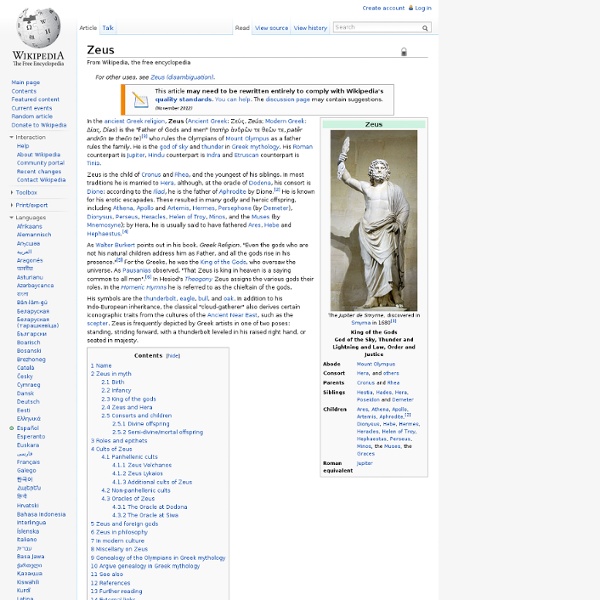Homer, The Iliad, Scroll 20
Scroll 20 Thus, then, did the Achaeans arm by their ships round you, O son of Peleus, who were hungering for battle; while the Trojans over against them armed upon the rise of the plain. Meanwhile Zeus from the top of many-delled Olympus, bade Themis gather the gods in council, whereon she went about and called them to the house of Zeus. There was not a river absent except Okeanos, nor a single one of the nymphs that haunt fair groves, or springs of rivers and meadows of green grass.
Calydon
Greek city in ancient Aetolia The Laphrion sanctuary plateau of Calydon with Varasova mountain on the background. Calydon or Kalydon (; Ancient Greek: Καλυδών) was a Greek city in ancient Aetolia, situated on the west bank of the river Evenus, 7.5 Roman miles (approx. 11 km) from the sea.[1] Its name is most famous today for the Calydonian Boar that had to be overcome by heroes of the Olympian age. Mythology[edit] The heroes of Calydon are among the most celebrated of the heroic age.
Balius and Xanthus
Mythology[edit] Poseidon gave the two horses to King Peleus of Phthia, as a wedding gift, when Peleus married the Ocean goddess Thetis. Peleus later gave the horses to his son Achilles who took them to draw his chariot during the Trojan War. At Iliad 17.474-8, Automedon, Achilles' charioteer, states that only Patroclus was able to fully control these horses.
Aetolia
Region of Ancient Greece Aetolia (Greek: Αἰτωλία, romanized: Aἰtōlía) is a mountainous region of Greece on the north coast of the Gulf of Corinth, forming the eastern part of the modern regional unit of Aetolia-Acarnania. Geography[edit] The Achelous River separates Aetolia from Acarnania to the west; on the north it had boundaries with Epirus and Thessaly; on the east with the Ozolian Locrians; and on the south the entrance to the Corinthian Gulf defined the limits of Aetolia. In classical times Aetolia comprised two parts: "Old Aetolia" (Greek: Παλιά Αιτωλία, romanized: Paliá Aitolía) in the west, from the Achelous to the Evenus and Calydon; and "New Aetolia" (Greek: Νέα Αιτωλία, romanized: Néa Aitolía) or "Acquired Aetolia" (Greek: Αἰτωλία Ἐπίκτητος, romanized: Aitolía Epíktitos) in the east, from the Evenus and Calydon to the Ozolian Locrians.
Briseis
Greek mythological character Brisēís (; Ancient Greek: Βρισηΐς, pronounced [brisɛːís]) ("daughter of Briseus"), also known as Hippodámeia (Ἱπποδάμεια, [hippodámeːa]),[2] is a significant character in the Iliad. Her role as a status symbol is at the heart of the dispute between Achilles and Agamemnon that initiates the plot of Homer's epic.
Laocoön
Trojan priest in Greek and Roman mythology Laocoön (;[1][2][Note 1] Ancient Greek: Λαοκόων, IPA: [laokóɔːn]), the son of Acoetes, is a figure in Greek and Roman mythology and the Epic Cycle.[3] He was a Trojan priest who was attacked, with his two sons, by giant serpents sent by the gods. The story of Laocoön has been the subject of numerous artists, both in ancient and in more contemporary times. Death[edit] The most detailed description of Laocoön's grisly fate was provided by Quintus Smyrnaeus in Posthomerica, a later, literary version of events following the Iliad.
Homer, The Iliad, Scroll 19
Scroll 19 Now when Dawn in robe of saffron was hastening from the streams of Okeanos, to bring light to mortals and immortals, Thetis reached the ships with the armor that the god had given her. She found her son fallen about the body of Patroklos and weeping bitterly. Many also of his followers were weeping round him, but when the goddess came among them she clasped his hand in her own, saying, "My son, grieve as we may we must let this man lie, for it is by heaven's will that he has fallen; now, therefore, accept from Hephaistos this rich and goodly armor, which no man has ever yet borne upon his shoulders."
Oeneus
Oeneus was a king of the area of Calydon in Greek mythology, son of King Porthaon and Queen Euryte. He married Althaea, with whom he had a number of children, including Deianeira, Meleager, Toxeus, Clymenus, Periphas, Gorge, Eurymede, Perimede and Melanippe. When Artemis sent a huge boar, called the Calydonian Boar, in his lands to ravage them because he had forgotten to honour the goddess, Oeneus asked his son Meleager to gather a party of heroes to kill the creature. The party consisted of Meleager, Atalanta, and Meleager's uncles; Atalanta played a major role in successfully hunting down and killing the boar. When the time came to give the boar's skin as a prize, Meleager gave it to Atalanta, despite the protests of his uncles who believed it should be theirs by right of birth. Meleager got furious and in the argument that broke out, he killed his uncles.
Homer, The Iliad, Scroll 21
Scroll 21 Now when they came to the ford of the full-flowing river Xanthos, begotten of immortal Zeus, Achilles cut their forces in two: one half he chased over the plain towards the city by the same way that the Achaeans had taken when fleeing panic-stricken on the preceding day with Hektor in full triumph; this way did they flee pell-mell, and Hera sent down a thick mist in front of them to stay them. The other half were hemmed in by the deep silver-eddying stream, and fell into it with a great uproar. The waters resounded, and the banks rang again, as they swam hither and thither with loud cries amid the whirling eddies.



